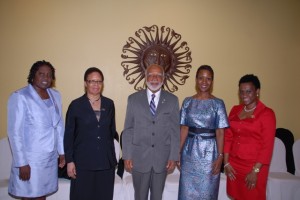BASSETERRE, ST. KITTS, AUGUST 12TH 2013 (CUOPM) – The Federation’s Minister of Foreign Affairs, the Hon. Patrice Nisbett hopes the just concluded two-day Retreat for Heads of Missions will chart an innovative and strategic course, realigning a foreign policy to reflect the order of the day.

“On the threshold of our celebration of the Thirtieth Anniversary since achieving nationhood, this exercise is as timely as it is crucial. It is anticipated that this Retreat will reinforce these priorities and rejuvenate and motivate us to remain good stewards and guardians of our nation’s interest in our engagements with the rest of the world,” Minster Nisbett said.
“In essence, foreign policy may be considered as a “strategy” to realize the larger national interest. It is a State’s responsibility to adopt policies – domestic and foreign – that are in the best interest of their societies. It follows therefore that to formulate a foreign policy of relevance, its crafters cannot be isolated from the realities of the domestic context but must be knowledgeable about the country’s goals and aspirations,” he told the Federation’s Ambassadors, High Commissioners and Consul General’s.
“This Retreat avails to our representatives in different postings around the world the opportunity to come home and interact with their colleagues here to achieve consensus on what should comprise the foreign policy of St. Kitts and Nevis,” said Mr. Nisbett, pointing out that as a State, St. Kitts and Nevis does not exist within a vacuum, but operates and interacts fully as a part of a global network.
“Consequently, while on one hand its foreign policy will be distinctive from that of another country due to its own national dynamics, yet, on the other hand, it will be influenced by what occurs around it. Knowledge about happenings within our domestic domain is equally important as awareness about contemporary and projected international realities which will also impact heavily upon our foreign policy,” said the Foreign Minister, who added:
“It is a truism that evolutions in economic policy will effect alterations in our foreign policy. The repercussions of the global financial and economic crisis remain current and will impact our outlook for generations to come.”
He continued that an element of continuity and change will pervade the Federation’s foreign policy based on past evolution and current orientation.
“We endeavour to maintain strong relations with traditional partners who uphold our principles of democracy, rule of law and respect; who continue to cooperate in a spirit of good will and fraternity. Central to our deliberations is the reality that the world we inherited after becoming a Nation has evolved significantly and as the process continues, we must also change with the times. The reality is that the region’s international relations have featured both a formal sector, namely relations among states, as well as an informal sector, that is, relations with non-state actors. Non-state multinational agencies have featured prominently in Caribbean affairs through the provision of economic assistance. As means of enforcement of an economic code of conduct in the international debt regime, multilateral organizations wield some level of political and economic clout,” the Foreign Minister said.
He also pointed out that in an open market economy era, “we find ourselves as developing nations, as it were thrown from a capsized boat in the ocean, battling for our survival.”
“We have come to realize that the term “survival of the fittest” transcends the sphere of science to the realm of international relations. One of the strategies of achieving diplomatic fitness is by developing a viable and meaningful foreign policy,” said Minister Nisbett, who reaffirmed St Kitts and Nevis’ full commitment to regional integration both via the OECS Economic Union and the CSME.
“While supporting regional efforts of integration and Caribbean convergence we shall ensure actions and commitments that concur with our national goals. These are definitive factors that will shape our nation’s policy and inform our discussion during this Retreat,” he said.
He told accredited diplomats overseas and those non-resident that the current global climate in which they operate presents challenges, which at times appear insurmountable, especially in the context of scare resources and fiscal constraints.
